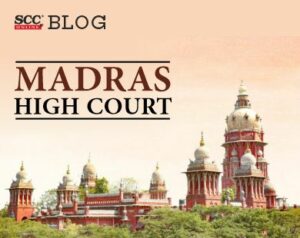Madras High Court: In a criminal appeal filed under Section 21(1) of the National Investigation Agency, Act, 2008, to set aside the order passed by the Magistrate, wherein the Magistrate allowed the petition filed under Section 43-D(1)(2)(b) of the Unlawful Activities (Prevention) Act, 1967 (‘UAPA’).and dismissed the petition filed by the accused for default bail on the same day on the ground that he has allowed the petition of the prosecution and has granted extension of period of remand to 180 days, the division bench of P.N. Prakash and N. Anand Venkatesh, JJ. while granting default bail to the accused, said that once the indefeasible right under the first proviso to Section 167(2) CrPC kicks in, the accused will be entitled to default bail, as a matter of right because Section 167(2) CrPC is directly relatable to Article 21 of the Constitution of India.
Further, directed the Tamil Nadu State Judicial Academy to conduct a refresher course to the judicial officers, by focusing on the special enactments like UAPA, POCSO Act, SC/ST Act, NDPS Act, etc. and make them aware of the procedure to be followed at the time of remand, extension of remand, extension of remand period from 90 days to 180 days, provided under certain enactments, taking cognizance of the final report etc.
In the case at hand, a complaint was filed by the police for the offences under Sections 121, 122 and 125 of the Penal Code, 1860 (‘IPC’) and Sections 18, 18-A, 20, 38 and 39 of the UAPA. The Court has relied on Bikramjit Singh v. State of Punjab, (2020) 10 SCC 616 and Jaffar Sathiq v. State, 2021 SCC OnLine Mad 2593 and reiterated that, till the Special Courts are constituted by the State, the Session Court alone will have the jurisdiction to entertain bail applications and the Station House Officers were directed to file final reports directly before the Special Court or the Session Court, since the Session Courts alone are entitled to decide bail applications. Further, as against the order passed in the bail applications, appeals can be filed only before the High Court, and it can be heard only by a Division Bench.
The Court said that Section 43-C of the UAPA provides that CrPC shall apply, insofar as they are not inconsistent with the provisions of the UAPA, to all arrests made under the UAPA. Section 43-D(2) of the UAPA specifically provides that Section 167 CrPC will apply in relation to a case, involving an offence punishable under the said Act and hence, a person who is arrested and detained in custody, must be forwarded to a Magistrate, within a period of 24 hours and the Magistrate is empowered to remand the accused to judicial custody. The first remand can be made by a Magistrate, even if he has no jurisdiction to try the case. However, once the Magistrate becomes aware of the fact that he has no jurisdiction to try the case or to commit it for trial, the further extension of judicial custody as provided under Section 43-D(2)(a) of the UAP Act, should be done only by the Special Court or the Session Court, since it is only these Courts which will have the jurisdiction to try offences under the UAPA.
The Court reiterated where a statutory bail petition is filed immediately on the expiry of 90 days, an indefeasible right accrues in favour of the accused for being released on bail, on account of default by the investigating agency in the completion of the investigation. This indefeasible right cannot be defeated by the prosecution, by filing a petition seeking extension of the remand period from 90 days to 180 days. Such a petition filed subsequently cannot be entertained by the Court and the time cannot be extended, by dismissing the statutory bail petition filed by the accused.
While quoting “Can the blind lead the blind? Will they not fall into a pit?”, the High Court said that the first blind person in this case is the Sessions Judge, who was guiding the Magistrate, who was also blind, due to ignorance of the legal position and ultimately, both fell in a pit, leading to illegal and non est orders passed by the Magistrate
The Court said that it is unfortunate that the specialised agency did not take over the investigation and the police were proceeding further in a mechanical fashion. To add insult to injury, even the trained Judicial officers were ignorant as to the procedure to be adopted in a case involving offences under the UAPA.
[Mir Anas Ali v. State, 2022 SCC OnLine Mad 5997, decided on 23-12-2022]
Advocates who appeared in this case :
For Appellant: Advocate J. Ravikumar;
For Respondent: Additional Public Prosecutor R. Muniyapparaj.
*Apoorva Goel, Editorial Assistant has reported this brief.

